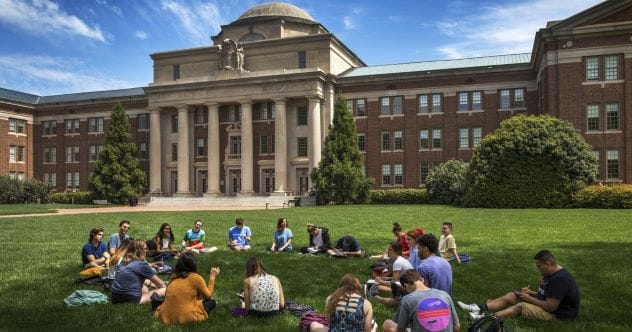Thinking about college? You might picture late-night study sessions, new friends, and maybe a few parties. But lately, some different, more worrying trends have started to pop up on U.S. campuses. These aren’t just about typical young adult mistakes; they could have much bigger effects on students and education itself. Let’s explore ten of these social shifts that are causing concern and sparking debate across the nation.
10. Self-Segregation
It might seem strange, but some U.S. colleges are seeing more students choosing to live or gather separately based on their race or background. This is often called self-segregation. For example, Western Washington University created special housing for its ‘Black Affinity Program.’ The program’s website says its goal is to help students ‘explore and celebrate the diversity of Black and African American people and culture.’ It’s meant to provide a supportive space for students, particularly during a key time of self-discovery.
Interestingly, the website also states that ‘Black Affinity Housing residents represent all diverse identities’—even though its specific focus is on Black culture. The stated intention is to foster ‘a sense of belonging for all residents by creating a safe environment for open, honest, and sometimes challenging dialogue.’ However, how these ‘safe environments’ truly invite ‘challenging dialogue’ from diverse viewpoints is a point of discussion.
This isn’t an isolated case. The National Association of Scholars launched an initiative to study what it calls ‘Neo-Segregation.’ Of 173 universities surveyed, 42% offer segregated residences, 46% have segregated orientation programs, and a significant 72% host segregated graduation ceremonies. While these programs may aim to help students from minority backgrounds connect with their culture, especially on campuses historically dominated by white students, many critics wonder if this trend truly promotes unity or if it echoes a past of ‘separate but equal’ that civil rights leaders fought to overcome.
9. Anti-Meritocracy
Imagine a highly qualified professor being uninvited from giving a science lecture, not for his research, but for an opinion he shared. This happened to Dorian Abbott, an Associate Professor of Geophysical Sciences at the University of Chicago. He was scheduled to speak at MIT about ‘Climate and the Potential for Life on Other Planets’—a purely scientific topic.
So, why was he disinvited? It wasn’t because his science was questionable. The issue stemmed from an opinion piece he wrote for Newsweek. In it, he criticized some current diversity, equity, and inclusion (DEI) standards in higher education. Abbott argued these standards could be anti-meritocracy, meaning they might not always prioritize individual skill and achievement. He proposed a new approach called ‘Merit, Fairness, and Equality,’ where students would be ‘treated as individuals’ and ‘evaluated through rigorous and unbiased’ processes based on their qualifications. For sharing this view, his MIT lecture was canceled.
Fortunately, Princeton University later invited Professor Abbott to give his lecture. It was so well-received that it exceeded its online capacity, showing a strong interest in his scientific work despite the earlier controversy.
8. Treating Moderates Like Radicals
It’s not entirely new for speakers with conservative viewpoints to face opposition or be disinvited from U.S. college campuses. However, a more subtle trend seems to be emerging: treating even moderate individuals as if they hold radical or threatening views. While outright attempts to suppress speech have reportedly decreased, more indirect forms of gatekeeping may be taking their place.
A telling example comes from Princeton University’s American Whig-Cliosophic Society, the oldest collegiate literary, political, and debate organization in the nation. According to a piece in the National Review, the student president of the society’s right-leaning party found that while his left-leaning counterparts had their speaker lists easily approved, his own suggestions faced rejections for being too ‘controversial.’
Among those deemed too controversial was George Will, a Pulitzer Prize-winning author, respected Washington Post columnist, and, notably, a Princeton alumnus. Will is widely regarded as a thoughtful and reasonable conservative voice. When someone of his stature and connection to the university is considered an ideological threat, it raises serious questions about the openness to diverse, yet mainstream, perspectives on campus.
7. Banning Conservative Student Organizations
Beyond disinviting speakers, an even more concerning trend is the outright banning of conservative student organizations. These are groups formed by students—the paying customers of the university. In 2017, the student senate at Santa Clara University in California voted to reject the formation of a chapter of Turning Point USA.
Turning Point USA’s stated mission is to ‘identify, educate, train, and organize students to promote the principles of fiscal responsibility, free markets, and limited government.’ These are essentially mainstream conservative ideas, aligning with one of the two major political parties in the U.S. Despite this, the student senate voted 16 against and 10 in favor of allowing the chapter.
The student senate chair described the decision as ‘a product of a rigorous, fair, and democratic process.’ However, one senator who voted in favor, Ahmer Israr, called it a ‘tyranny of the majority’ that trampled on the rights of an ‘intellectual minority group on campus.’ During debates, supporters emphasized intellectual freedom, but the organization was ultimately treated as a threat. This highlights a tendency to label mainstream conservative views as extreme or dangerous.
6. Illiberal Liberalism
It’s not just conservative voices that are being quieted on college campuses. Some left-leaning educators who are not considered ‘progressive enough’ by current standards also face significant challenges. This phenomenon has been termed ‘illiberal liberalism.’ Peter Boghossian, a tenured philosophy professor at Portland State University, who described himself as a classical liberal and had never voted Republican, experienced this firsthand.
As a philosophy professor, Boghossian believed in exposing his students to a wide array of viewpoints. He regularly invited speakers from various backgrounds and with differing opinions, precisely because he didn’t always agree with them. He saw value in ‘messy and difficult conversations’ for developing critical thinking. However, he felt that university officials increasingly pushed back against this approach.
In his resignation letter, Boghossian stated that the university had ‘transformed a bastion of free inquiry into a Social Justice factory whose only inputs were race, gender, and victimhood and whose only outputs were grievance and division.’ He argued that students were being ‘trained to mimic the moral certainty of ideologues’ rather than taught to think critically. His letter, significantly, was published on the Substack of Bari Weiss, a left-leaning writer who also claimed she was pushed out of The New York Times for not being progressive enough.
5. Abdicating Their Primary Purpose: Education
Following on from the previous point, Professor Peter Boghossian’s experiences highlight a broader concern: that some universities may be stepping away from their core mission of education. He argued that faculty and administrators have ‘abdicated the university’s truth-seeking mission and instead drive intolerance of divergent beliefs and opinions.’ This not only prevents opposing ideas from being discussed but also conditions students with different opinions to stay silent.
This fosters what he called a ‘culture of offense where students are now afraid to speak openly and honestly.’ He described how questions at diversity trainings that challenged approved narratives were quickly dismissed. Those who asked for evidence to support new institutional policies were accused of microaggressions. Even assigning classic texts by philosophers who happened to be European and male could lead to accusations of bigotry.
This environment of careful self-censorship and fear of being shamed or ‘canceled’ can feel very much like navigating social media, where groupthink can be powerful. When colleges encourage or even allow such an atmosphere, they risk teaching students to limit their thoughts to what is deemed acceptable, potentially producing graduates who are less equipped for independent, critical thinking.
4. Deciding What’s Funny (and What Isn’t)
When you think of places with a great sense of humor, politically correct college campuses might not be the first to come to mind for some. The intense focus on political correctness has made many American colleges a no-go zone for a growing number of comedians. These comedians often believe that stand-up comedy should be, well, funny and sometimes a bit irreverent to make a point.
This isn’t just about conservative comedians. Even very liberal performers like Bill Maher have largely avoided campuses since 2014, when UC Berkeley activists opposed his commencement speech due to past remarks critical of some aspects of Islam. Surprisingly, even Jerry Seinfeld, who is known for his observational humor that rarely touches politics and avoids swearing, steers clear of colleges. He finds students can be overly hypersensitive. As one Seinfeld writer put it, ‘When you think about Jerry Seinfeld not being willing to do college campuses because of political correctness, I think you got a real problem.’
And what about edgier comics known for pushing boundaries, like Louis C.K., Chris Rock, Dave Chappelle, or Pete Davidson? Many of them also choose to skip college gigs. It makes one wonder if legendary comedians of the past—like Richard Pryor, George Carlin, or Joan Rivers—would find it just as challenging to perform on today’s campuses.
3. Denying Due Process
It’s vital that individuals who have experienced sexual harassment, assault, or rape have their voices heard and receive support. This newfound empowerment is long overdue. However, a concern has emerged that in the effort to protect victims, some college procedures might leave accused individuals, often men, without adequate defense or fair process—a principle known as due process.
Writing for The Atlantic, Emily Yoffe discussed how, at many schools, rules designed to protect victims of sexual assault can result in accused students losing their right to due process. An accusation alone, she argues, can derail a person’s entire college education, sometimes before a full and fair investigation. These situations aren’t always straightforward accusations of force; sometimes, life-altering complaints arise from encounters that were initially mutual but ended with one person feeling subjectively uncomfortable later.
Yoffe described an incident where a woman, after a consensual act, later felt ‘sexually assaulted’ by a playful grab and kiss while fully clothed. This led to the accused man being suspended, banned from campus housing, and suffering serious stress-related health issues. For Yoffe, such cases show how some campus remedies, while well-intentioned, can be ‘unjust to men, and ultimately undermine the legitimacy of the fight against sexual violence’ by not ensuring fairness for all parties.
2. A Growing Gender Imbalance
For a long time, the focus in higher education was on women catching up to men in enrollment numbers. Those days are over. In fact, the situation has reversed significantly. If you start typing ‘why aren’t men’ into Google, one of the first autocomplete suggestions is ‘going to college.’
During the 2021-22 academic year, nearly 60% of college students in the U.S. were women. This gender gap has been gradually widening for decades. About fifty years ago, the numbers were almost exactly the opposite. The trend seems to be speeding up: over the past five years, overall U.S. college enrollment has dropped by about one million students, and men accounted for more than 70% of this decline.
Experts offer various reasons for this shift. Some point out that in elementary and high school, boys are more likely to be held back, drop out, or have difficulties with reading. Economists suggest that some men might be more attracted to jobs available right after high school, especially in fields like construction or law enforcement that don’t always require a college degree and tend to be male-dominated. Regardless of the causes, this growing imbalance will likely have significant social and economic consequences, as college graduates generally earn much more over their lifetimes and often report greater job security and life satisfaction.
1. Prompting a “Radical Centrist” Education Backlash
This final trend might eventually be seen as a positive development, but the fact that it’s happening at all is quite telling. Many of the concerns listed above have led a group of moderates from various backgrounds to decide they’ve had enough. They’ve gone ahead and started planning their own college.
In late 2021, news emerged that several current and former Harvard University professors, along with other prominent thinkers, are helping establish the University of Austin (UATX). This new Texas-based liberal arts school is being created specifically to counter what its founders see as a growing culture of censorship and intellectual conformity in higher education. Founders include well-known figures like politically centrist writer Bari Weiss, former Harvard President Lawrence H. Summers, Harvard professors Arthur C. Brooks and Steven Pinker, and Brown University economist Glenn Loury.
Steven Pinker stated that ‘too many of the country’s universities are stuck in the same rut,’ which includes ‘exorbitant tuition, a mushrooming bureaucracy…and increasing political homogeneity, including repression of speech and ideas.’ Another co-founder, Panayiotis Kanelos, former president of St. John’s College, questioned whether ‘the pursuit of truth—once the central purpose of a university—remains the highest virtue’ at many top schools. The University of Austin aims to reaffirm that original mission.
These trends on U.S. college campuses paint a complex picture. From how students interact and learn to who even attends college, big changes are underway. While many efforts aim to make campuses safer and more inclusive, they also spark debates about free speech, fairness, and the very purpose of higher education. It’s clear that colleges are at a crossroads, figuring out how to prepare students for a changing world while holding onto core values.
What are your thoughts on these campus trends? Have you seen any of this firsthand? Share your experiences and opinions in the comments below! We’d love to hear from you.
Let us know what you think!










